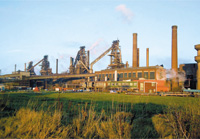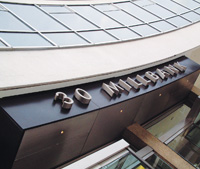 |
|
|
International Operations

 Blast furnaces at Corus’ integrated steel works at Scunthorpe, UK
Blast furnaces at Corus’ integrated steel works at Scunthorpe, UK
named after Britain’s Four Queens. |
 |
Millbank in London
where Corus’ head
office is located. |
Corus is Europe’s second largest steel producer with annual
revenues of Rs. 82,674 crores (£9.7 billion) and crude steel
production of 18.3 million tonnes in 2006. Corus has a presence
in nearly 50 countries, including its global network of offices
and service centres.
Corus’ shares were listed (de-listed post the acquisition) on the
London, New York and Amsterdam Stock Exchanges until the
acquisition of Corus Group plc by Tata Steel in April 2007.
Corus was formed on October 6, 1999 following the merger of
Koninklijke Hoogovens and British Steel. Philippe Varin who was
appointed as Chief Executive of Corus in May 2003 launched
the “Restoring Success” programme, designed to deliver a
Rs. 5,796 crores (£680 million) EBITDA improvement in Corus’
financial performance. This programme, completed at the
end of 2006, has underpinned the significant improvement in
Corus’ financial performance, delivering savings through cost
reductions and improved operational efficiency. It has also
delivered significant improvements in safety performance and
customer service levels.
Corus operations
Corus’ main steelmaking operations are located in the UK and
the Netherlands with other plants located in Germany, France,
Norway and Belgium. Corus produces carbon steel by the basic
oxygen steelmaking method at three integrated steelworks in
the UK at Port Talbot, Scunthorpe and Teesside, and at one in
the Netherlands at IJmuiden. Engineering steels are produced
in the UK at Rotherham using the electric arc furnace method.
Corus estimates that, as at 30 December 2006, it was the ninth
largest steel producer in the world and produced 18.3 mt of
crude steel in 2006 (equivalent to 18.8 mt of liquid steel).
Corus has four main operating divisions; Strip Products, Long
Products, Distribution & Building Systems and Aluminium, each
being the responsibility of an individual Executive Committee
member. The activities of each division are organised into
individual business profit centres, each of which has its own
managing director who, with the respective management
team, has responsibility for the performance of that business.
Corus has sales offices, stockholders, service centres and joint
venture or associate arrangements in a number of markets for
distribution and further processing of steel products. These are
supported by various agency agreements. There is an extensive
network in the EU while outside the EU Corus has sales offices
in around 30 countries, supported by a worldwide trading
network.
Market focus
Corus delivers innovative solutions, differentiated products,
reliable service and sound technical advice to its customers
around the world. Principal end markets for Corus’ steel products
are the construction, automotive, packaging, mechanical and
electrical engineering, metal goods, and oil and gas industries.
Construction is the largest market sector for Corus, with a
strong position in commercial and industrial construction. New
opportunities are being explored in areas, which show growth
potential such as residential, health and education. Corus is
a leading supplier to the automotive sector and is the third
largest supplier to this sector in Europe.
Europe, principally the EU, is the most important market for
Corus, accounting for 80% of total turnover in 2006. Corus’ steel
divisions accounted for 91% of total turnover in this period.
TOP |
|
 |